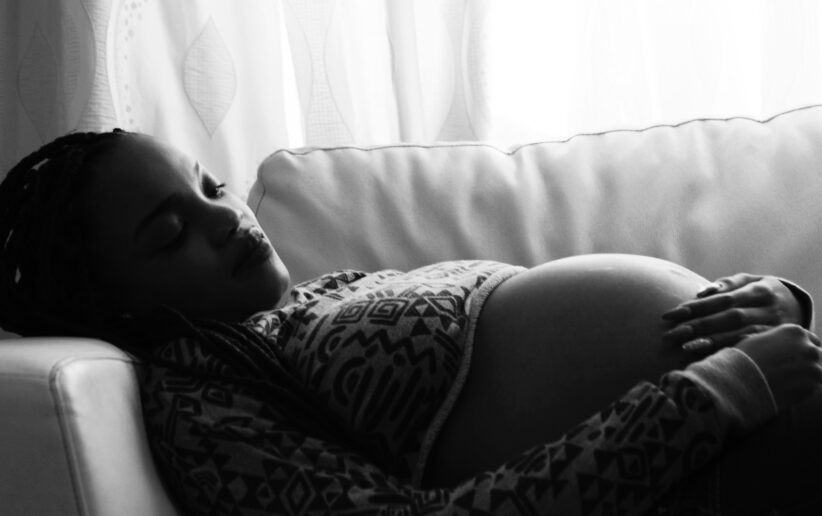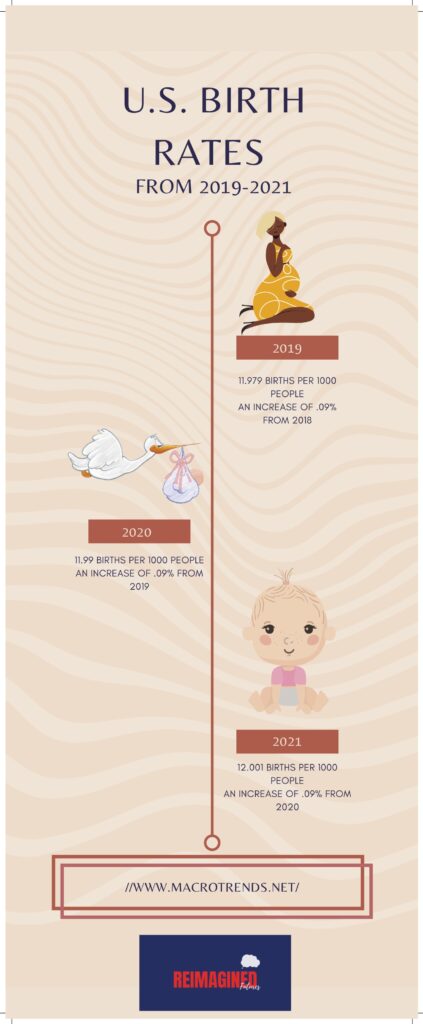Victoria Smith, Reimagined Futures for Howard University News Service
Adjusting to the pandemic thus far is nothing new to Americans citizens, since the virus has been circulating within the United States for over a year now. Some have chosen to throw caution into the wind by following their own guidelines and not those set by the Centers of Disease Control and Prevention (CDC). However, lots of others have continued to heed the warnings of the CDC by maintaining social distancing guidelines, wearing masks while being outside of their homes and remaining away from family members and friends who are at a higher risk of catching the disease. While having to navigate this virus, there is one thing that hasn’t changed since the pandemic began: babies being born.
During this epidemic, hospitals and medical centers have needed to go into overdrive in order to care for covid patients as well as the typical patients that normally come in to seek medical attention. Among those typical patients are pregnant women. Coming in and out for ultrasounds, periodic checkups or to even give birth, women have refused to allow the pandemic to stop them from bearing life.
While it is admirable that soon to be parents are able to bring new life into this world, there are many more factors to consider because of the current predicament. Besides the standard pregnancy concerns, there could be effects of the virus on the woman and/ or her child. Pregnant women have to deal with the after birth effects on their body as well as possible effects of this virus. If not properly handled, the outcome could trickle down to the fetus as well. The CDC has advised pregnant women to adhere to the same guidelines provided to those who aren’t pregnant, in addition to the following: “Keep all of your healthcare appointments during and after pregnancy. Get recommended vaccines during pregnancy. Call your healthcare provider if you have any concerns about your pregnancy or if you get sick or think that you may have COVID-19.”
According to MacroTrends, the birth rate for the United States during 2020 was 11.99 births for every 1000 people, which was a .09% increase from 2019. The current birth rate has gone up by another .09% during this current year and its outcome yields a rate of 12.001 births for every 1000 people. These rates aren’t anything different from the norm and again, there seems to be a trend in the percentage of births per year at .09%. Although these rates are remaining on trend, these percentages would not be anything to take a second look at if the United States was operating as it was in previous years, however, it is apparent that the current circumstances are different for the nation’s residents.
Lauren Clemons-Hackett, who currently resides in Houston, Texas, is a wife and mother to two daughters and is pregnant with a little boy who is expected to be born on May 17 of this year. She is almost at the end of her pregnancy journey and it is becoming more of a reality that she will have to bear her son while still living through this pandemic. Overall, she is excited about her pregnancy, but of course she still has her concerns and reservations. She says, “The main thing that makes me nervous is that there is no requirement for pregnant women to get vaccinated so I don’t plan on getting vaccinated while pregnant. I’d like for there to be more data and I’d like for the vaccine to be out in the public a little bit longer before I would take it, especially being pregnant.”
Since precautions and measures have to be taken to ensure the safety of not only the mother, but also the baby, Lauren voiced concerns about the upcoming delivery experience. “My previous births I had my mom, my aunt and my husband and I relied on all of them in different ways, so this is gonna be different having to do this with just one of them.” Having to choose only one person to accompany you in the delivery room is a very heavy choice. It’s an extremely tough decision and whomever you choose will have to take on all the responsibilities of being there for the mother emotionally.
Despite these concerns, she is still on track to have a relatively smooth pregnancy. During medical checkups, doctors haven’t warned her of any current or potential differences in her child, which is always good to hear.
Currently, there aren’t any adverse effects that have been documented as a result of the virus, and this could be because of the newness of this situation. However, numerous studies have been and are in the process of being conducted and examples of those studies are the PRIORITY Study, the HOPE COVID-19 Study, and the ASPIRE Study.
Dr. Ifeyinwa Asiodu, an assistant professor in the department of Family Healthcare Nursing at the University of California in San Francisco, is a part of the Reproductive Health Equity and Birth Justice core in the PRIORITY Study. Her specific core is led by Black women at UCSF who are focusing on those communities that are most marginalized and impacted by this virus. “When the coronavirus was first identified as a public health issue, the main focus at that time was our elderly population…or those who had more compromised immune systems…There wasn’t really a focus on pregnant people and the impact of this new infectious disease at that time. My colleagues and I thought this was a good opportunity to discover the impact…that COVID-19 could have during your pregnancy, after the pregnancy…and what also was the impact on the infant’s first year of life.”
She continues by stating what she and her colleagues have found thus far in their research. “Unfortunately we’ve seen adverse outcomes for pregnant folks who’ve been infected with coronavirus, including higher rates of ICU admission, the use of mechanical ventilation and even- unfortunately- death…other studies have shown higher rates of preterm birth and emergency C-sections in relation to infection with the virus.”
Dr. Asiodu also shared her thoughts on the Moderna, Pfizer and Johnson & Johnson vaccines and how they could impact pregnant women during this time. “I think this is a subject pregnant women need to have with their provider and their family. They need to have all the information to make the most informed decision for themselves and for their infant. Given what we know about the symptoms and the potential for death, those that are in work environments or have greater risk of being exposed to COVID-19…should definitely consider if/when offered taking the vaccine.” She continues, “Both Moderna and Pfizer are doing trials with pregnant and lactating people…I think having that evidence that it is safe and knowing that pregnant and/or lactating people actually participated…will only help make the case for why it’s safe and why it’s important.”
At the moment, it is unclear whether or not the coronavirus has any effects on pregnant women. Studies and research are still being run in order to discover all possible outcomes. Though measures have been put in place in hospitals and in certain public areas, it is still important to adhere to social distancing guidelines and to remain as clean as humanly possible, especially during a pregnancy. Ultimately, only time will be able to give the public a full picture of what pregnant women need to expect until the virus has completely subdued.












